Search results for "herbert lomas/www.booksfromfinland.fi/2004/09/no-need-to-go-anywhere"
From the land of abundant reindeer…
17 March 2011 | This 'n' that
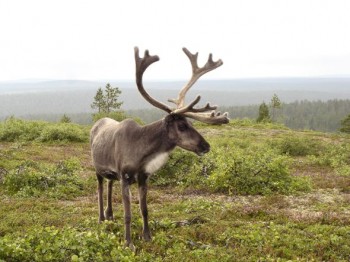
Rangifer tarandus, Finnish Lapland. Photo: Grand-duc (http://en.wikipedia.org/wiki/User:Grand-Duc)
Is Finland, a land of reindeer, ‘dense pine forests and deep snows’ also a ‘quiet literary landscape’?
Not exactly, as we at Books from Finland hope we are demonstrating. And over on the Bookslut website, Bonnie B. Lee comes to the same conclusion, after having mused about the reindeer (yes: in Helsinki you find tasty chunks of them in the freezer boxes of any foodstore) and reading three Finnish novels in English translation.
The novels Lee reviews are Purge by Sofi Oksanen (Puhdistus, 2008, translated by Lola Rogers, published last year), When I forgot by Elina Hirvonen (Että hän muistaisi saman, 2005, translated by Douglas Robinson, published in 2009) and The Year of the Hare by Arto Paasilinna (Jäniksen vuosi, 1975, first published in an English translation by Herbert Lomas in 1995, reprinted as a Penguin edition last year).
We have just entered the Year of the Rabbit, in recognition of which Paasilinna’s book (about a man who rejects his old life and goes roaming the wildernesses with a hare as his only companion) has appeared on the tables of large bookstores in the US. ‘The Year of the Hare is only the most Finnish, and perhaps most antically Zen-ish, of a shelf-load of books that tell us to find and live by our own ideas of contentment,’ said The Wall Street Journal.
The traumatic experiences of war and Finland’s deep forests are the common feature of these novels, Bonnie B. Lee finds. She also opines that ‘melancholy pervades the Finnish psyche’, and that ‘Finland vies with Hungary for highest suicide rate in Europe‘. Oh, but this latter is no longer true: number one on a World Health Organisation suicide rates list is Lithuania, followed by Hungary, Slovenia, Estonia and Latvia – Finland is number six.
Lee is clearly intrigued by her travels in contemporary Finnish literature. ‘The search for identity, a reckoning with a troubled past, and an outsider’s view looking in,’ she comments, ‘are all the stuff of great writing, and Finland is poised to continue to produce poignant and introspective literature that we can appreciate now that English translators have begun the work.’
Poignant and introspective or occasionally funny and fantastical, this is the work we try to offer an early glimpse of, in translation, at Books from Finland. Stay with us!
Books from Helsinki
30 June 2013 | This 'n' that
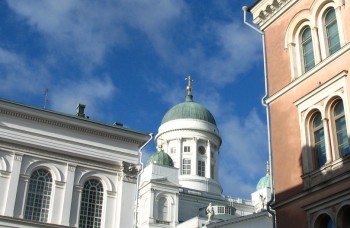
Helsinki: view it from different angles! Photo: Leena Lahti
Helsinki is relatively young city, Finnish literature even younger.
Flushed with a huge wave of migration at the beginning of the 20th century, the capital and its people went through the dramatic times of gaining independence and the Civil War (1917–18). The capital – since 1812 – and the life experiences of its inhabitants have been plentifully featured in Finnish fiction.
In his doctoral dissertation, Lieven Ameel has concentrated on a period of Finnish literary history. His Moved by the City: Experiences of Helsinki in Finnish Prose Fiction 1889–1941 (2013, Department of Finnish, Finno-Ugrian and Scandinavian Studies, University of Helsinki) examines more than sixty novels, collections of short stories and individual short stories portraying the city: how do the characters experience this urban public space? (Popular – crime fiction, for example – and children’s literature are excluded.) More…
Notes from underground
30 September 2003 | Fiction, Prose
Extracts from the crime novel Harjunpää ja pahan pappi (‘Harjunpää and the priest of evil’, Otava, 2003)
Killing a person wasn’t difficult. No more of a problem than killing a pigeon. It only needed a slight push – at the right time, of course, and in the right place. He if anyone had the ability to scent out the time and place, or rather perhaps they were revealed to him in a certain way; and, hey presto, the flesh did come off the bones and the veins burst open on the macadam, and vertebrae and joints rolled about like beans, and the life departed from all that filth that had turned a person into a devil of greed. Of course he knew that. He’d seen it and smelt with his own nostrils the stench of raw human flesh that gave you that sweet shudder. More…
Caravans of winds
30 June 1988 | Archives online, Fiction, poetry
Poems from three collections. Introduction by Kaija Valkonen
The river of death froze
It froze, the river of death, froze too the boat of death in the nights of the Winter War, in the Winter War's nights. The men shed blood, shed blood , and it froze, the river of death. In the nights of the Winter War, it froze, the river of death.
Day of mourning
For one day I’ve the right to mourn,
for one day I’ll shut the windows of the sky,
I’ll dismiss the blue,
I’ll raise a black sun to mark my mourning.
For one day I’ll wilt the flowers,
for one day I’ll silence the birds. More…
The Cheap Contractor
30 June 1986 | Archives online, Fiction, Prose
From Kauan kukkineet omenapuut (‘Long-blossoming apple trees’, 1982). Introduction by Arto Seppälä
The men who delivered the hot-water cylinder offered to do the installation as well. I asked how much it would be. They lolled about a bit, exchanged a few private looks, pretended to be thinking. Then one of them fired off a sum. It was three times the quotation I’d already had. They didn’t even look at the location. I told myself I wouldn’t even go to the end of the road with big-dealers like these.
The same evening I rang up ‘a little man’ and told him he could get started as soon as it suited him.
The cheap contractor turned up a couple of days later, driving an elderly van into the yard. I went out. He’d sat himself down in a garden chair near the white lilacs. The morning sun only partially reached there; so half his body was in shade, looking colder than the sunny half. More…
Landscapes of the mind
30 June 1986 | Archives online, Fiction, poetry
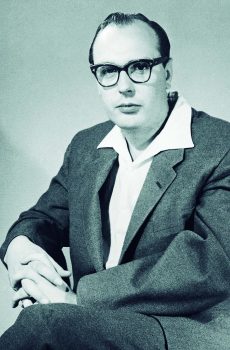
Tuomas Anhava. Photo: Otava
In his book Suomalaisia nykykirjailijoita (‘Contemporary Finnish writers’), Pekka Tarkka describes Tuomas Anhava’s development as a poet as follows: In his first work, Anhava appears as an elegist of death and loneliness; and this classical temperament remains characteristic in his later work. Anhava is a poet of the seasons and the hours of the day, of the ages of man; and his scope is widened by the influence of Japanese and Chinese poetry. As well as his miniature, crystalclear, imagist nature poems, Anhava writes, in his Runoja 1961 (‘Poems 1961’), brilliant didactic poems stressing the power of perception and rebuffing conceptual explanation. The mood in Kuudes kirja (‘The sixth book’, 1966) is of confessionary resignation and intimate subjectivity.
Anhava’s literary inclinations reflect his most important translations, which include William Blake’s The Marriage of Heaven and Hell (1959), selections of Japanese tanka poetry (1960, 1970, 1975), Saint John Perse’s Anabasis (1960), a selection from the works of Ezra Pound, published under the title Personae, and selections from the work of the Finland-Swedish poets Gunnar Björling and Bo Carpelan.
![]()
Song of the black
My days must be black,
to make what I write stand out
on the bleached sheets of life,
my rage must be the colour of death, to make my black love stand out,
my nights must be summer white and snow white,
to make my black grief burn far,
since you're grieving and I love you
for your undying grief.
Let the sun's rolled gold gild dunghills,
let the moon's blue milk leak out till it's empty,
we're not short of those.
The obscure black darkness of the cosmic night
glitters on us enough.
From Runoja (1955)
Underage
30 June 1999 | Archives online, Fiction, Prose
A short story from Leiri (‘Camp’, Otava 1972). Interview by Maija Alftan
In the dark and wet the tram seemed like a stale-smelling and badly-lit waiting room at a country station, its Post Office Savings Bank advertisement set out of reach of vandalising underage hands. The conductress was two-thirds out of sight behind her desk: a small person. I glanced at the time stamped on my ticket. My only timepiece.
It was the time of day when you can see your own face in the window and through to the outside as well. I stood in the doorway, hanging onto the bar. As the tram turned into the narrow canyon of Aleksanterinkatu, the street seemed like some kind of cellar. Fantastic, how the world darkens at the end of the year. And then, when it’s at its darkest, everything goes totally white. The low-slung cars seemed to be slinking round the tram’s feet. More…
This journey
30 September 1995 | Archives online, Fiction, poetry
Poems from Tämä matka (‘This journey’, 1956). Introduction by Jukka Petäjä
You took a planet
For Erik Lindegren
The stars arranged themselves
round a red magnet
by request,
and shaped fugitive systems and mirror reflections,
space’s sonorous grammar.
Oh, those hatched-out faces of the apathetic! –
and the grudge of those who can no longer read
(apart from cruel bibles, containing pressed roses and corpses).
Oh, ourselves! – here in the lonely sublunar place, hair and eyes in the wind, in our hands ignorance and boomerang-echoes.
Oh, these vaultings of the word! – changing skies
where the glyphs rise like distress flags.
I looked for a question whose answer is this mutabor. I kneel to gather up the shattered fragments of a glyph scored with the brilliant wounded secret where I lost my wings before my choosing fingers were formed.
More…
Living inside language
23 February 2010 | Essays, Non-fiction
Jyrki Kiiskinen sets out on a journey through seven collections of poetry that appeared in 2009. Exploring history, verbal imagery and the limits of language, these poems speak – ironically or in earnest – about landscapes, love and metamorphoses
The landscape of words is in constant motion, like a runner speeding through a sweep of countryside or an eye scaling the hills of Andalucia.
The proportions of the panorama start to shift so that sharp-edged leaves suddenly form small lakeside scenes; a harbour dissolves into a sheet of white paper or another era entirely. Holes and different layers of events begin to appear in the poems. Within each image, another image is already taking shape; sensory experiences develop into concepts, and the text progresses in a series of metamorphoses. More…
Poems
30 June 1982 | Archives online, Fiction, poetry
Sirkka Turkka is among the most important poets who started their work in the 1970s. So far she has published five collections of poetry and one work in prose. ‘I speak of death when I mean to speak of life,’ writes Sirkka Turkka in one of the poems in her collection Mies joka rakasti vaimoaan liikaa (‘The man who loved his wife too much’, 1979). The theme of death is close at hand, too, in the previously unpublished poems printed below. Introduction by Arto Kytöhonka
1
Before death itself comes
it paints the pine boles red
around this house
It erects a moon in the sky, a luminous moon,
set on edge like an old dish
with the light enamel peeling off.
Onto this house, over which
night is now pleating.
And the house, in the veering waters, in the clinging waters,
is slowly preparing itself, quite by itself, for death. More…
World noises
30 September 1992 | Archives online, Fiction, Prose
Poems from Fahrenheit 121 (1968) and Jos suru savuaisi (‘If grief should smoulder’, 1968). Introduction by Tuula Hökkä
For truth to tell
I like horses most
creating Those
It came off best
*
Morning came to the meadow;
horses were born out of mist.
How quiet they were:
one leant a head on his master’s armour,
his breath rose warm,
his moist eye gleamed in the daybreak,
his coat a casbah carpet-weaver’s hand-woven pile,
his muzzle softer than a phallus. More…
We’re all perfect
31 December 1990 | Archives online, Fiction, poetry
Poems from Laki (‘The law’, 1990)
The Law
No one’s stupid – there are
people deprived of the wise,
and those with self-respect
knocked flat. No one’s
hardened – there are people with
calloused wounds.
No one’s blind – there are
people cataracted by custom. Be different:
heal wounds and look up – wake
your dear one in mid-sleep, hug her.
(We’re all perfect.) More…
New from the archive
26 March 2015 | This 'n' that
This week, a cluster of pieces from and about left-leaning Tampere, the ‘Red City’ of Finland
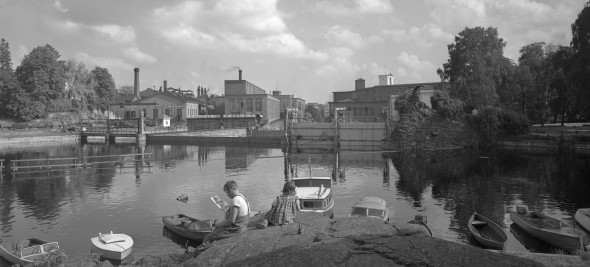
The Tampella and Finlayson factories, 1954, Tampere. Photo: Veikko Kanninen, Vapriikki Photo Archives / CC BY-SA 2.0.
Also known as the ‘Manchester of Finland’ for its 19th-century manufacturing tradition, Tampere – or rather the suburb of Pispala – produced two important, and strongly contrasting, writers, Lauri Viita (1916-1965) and Hannu Salama (born 1936). Both formed part of a group of working-class writers who emerged after the Second World War, many of whom had not completed their school careers and whose confidence arose from independent, auto-didactic, reading and study.
To understand the place from which these writers emerged, it has to be remembered that there is more to Tampere than a proud radical tradition. As Pekka Tarkka remembers in his essay, the Reds were the losing side in the Finnish civil war of 1918, and for years afterwards they formed ‘a sort of embattled camp in Finnish society’. History is always written by the winners, and authors like Viita and Salama played an important role in giving the Red side back its voice.
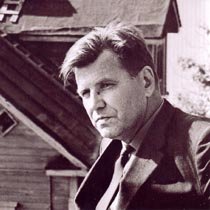
Lauri Viita.
Lauri Viita celebrated Tampere by offering an image of it that is, as Tarkka remarks, ‘poetic, deterministic and materialist’. His poetry differed sharply from the modernist verse of contemporaries such as Paavo Haavikko and Eeva-Liisa Manner, both of whom we have featured recently in our Archive pieces, which abandoned both fixed metres and end-rhymes. His work was an often heroic celebration of the ordinary life of proletarian Tampere, and the more traditional form into which it breathed new life made it accessible. My own mother, for example, who had grown up the child of a Red working-class family far away to the north, in Kajaani, steeped in the rolling cadences of poets such as Aaro Hellaakoski and Uuno Kailas, never really got the hang of Haavikko, or Manner; but she loved Viita.
Here we publish a selection of Viita’s poems, translated by Herbert Lomas, who does an excellent job of capturing his easy-going, unselfconscious rhythms. The introduction is by Kai Laitinen.
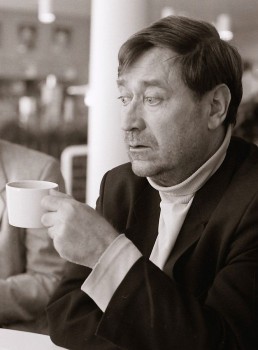
Hannu Salama.
Photo: Ptoukkar / CC BY-SA 3.0
Salama is a far more politicised writer than Viita, and he is writing about a Tampere that is already in decline. In his major work, Siinä näkijä missä tekijä (‘No crime without a witness’, 1972), he writes about the travails of the communist minority, doomed to slow extinction – the same band of fellow-travellers to which my grandfather in Kajaani belonged. My mother wasn’t a Salama fan, though – I think his Tampere wasn’t beautiful, or heroic, enough. As someone who had moved far away, to England, she wanted to celebrate, not to mourn.
Here we publish a short story, Hautajaiset (‘The funeral’), which was written at the same time as Siinä näkijä missä tekijä. It’s an unvarnished account of a Tampere funeral which is, at the same time, the funeral of the old, radical way of life – which, sure enough, has vanished almost as if it never existed. As Pekka Tarkka writes of Salama’s short story and the revolutionary songs which run through it: ‘There will be no more singing of communist psalms, or fantasies of the family and of the revolutionary spirit.’
As Marx didn’t say, all that seemed so solid has melted, irretrievably, into air.
*
The digitisation of Books from Finland continues, with a total of 380 articles and book extracts made available online so far. Each week, we bring a newly digitised text to your attention.
Burnt orange
30 September 1992 | Archives online, Drama, Fiction
Extracts from the play Poltettu oranssi (‘Burnt orange‘): ‘a ballad in three acts concerning the snares of the world and the blood’. Introduction by Tuula Hökkä
The scene is a small town in the decade before the First World War
Cast:
DR FROMM
an imperial,bearded middle-aged gentleman
ERNEST KLEIN
a moustached, ageing, slightly shabby leather-manufacturer
AMANDA KLEIN
his wife, well-preserved, forceful, angular
MARINA KLEIN
their daughter, shapely, withdrawn, wary
NURSE-RECEPTIONIST
open, direct, not too ‘common’
ACT ONE
Scene two
After a short interval the receptionist opens the door and ushers Marina Klein into the surgery. Exit the receptionist. Marina immediately goes to the end of the room and presses herself against the white wall. The white surface makes her look very isolated in her ascetic black dress. The Doctor, who now appears to be headless – an impression produced by the lighting and the yellowish background – half-turns towards her. More…
